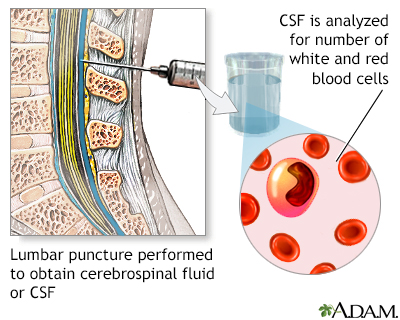CSF cell count
A CSF cell count is a test to measure the number of red and white blood cells that are in cerebrospinal fluid (CSF). CSF is a clear fluid that is in the space around the spinal cord and brain.
Images

How the Test is Performed
A lumbar puncture (spinal tap) is the most common way to collect this sample. Rarely, other methods are used for collecting CSF such as:
- Cisternal puncture
- Ventricular puncture
- Removal of CSF from a tube that is already in the CSF, such as a shunt or ventricular drain.
After the sample is taken, it is sent to a lab for evaluation.
Why the Test is Performed
The CSF cell count may help detect:
- Meningitis and infection of the brain or spinal cord
- Tumor, abscess, or area of tissue death (infarct)
- Inflammation
- Bleeding into the spinal fluid (secondary to subarachnoid hemorrhage)
Normal Results
The normal white blood cell count is from 0 to 5. The normal red blood cell count is 0.
Note: Normal value ranges may vary slightly among different laboratories. Talk to your doctor about the meaning of your specific test results.
The examples above show the common measurements for results for these tests. Some laboratories use different measurements or may test different specimens.
What Abnormal Results Mean
An increase of white blood cells indicates infection, inflammation, or bleeding into the cerebrospinal fluid. Some causes include:
- Abscess
- Encephalitis
- Hemorrhage
- Meningitis
- Multiple sclerosis
- Other infections
- Tumor
- Neurosarcoidosis
Finding red blood cells in the CSF may be a sign of bleeding. However, red blood cells in the CSF may also be due to the spinal tap needle hitting a blood vessel.
Additional conditions which this test may help diagnose include:
- Arteriovenous malformation (cerebral)
- Cerebral aneurysm
- Delirium
- Guillain-Barré syndrome
- Stroke
- Neurosyphilis
- Primary lymphoma of the brain
- Seizure disorders, including epilepsy
- Spinal tumor
Related Information
MeningitisTumor
Abscess
Acute
Multiple sclerosis
Cerebral arteriovenous malformation
Aneurysm in the brain
Delirium
Dementia
Epilepsy
Guillain-Barre syndrome
Neurosyphilis
Primary lymphoma of the brain
Spinal tumor
Syphilitic aseptic meningitis
Tabes dorsalis
References
Deluca GC, Griggs RC. Approach to the patient with neurologic disease. In: Goldman L, Schafer AI, eds. Goldman-Cecil Medicine. 26th ed. Philadelphia, PA: Elsevier; 2020:chap 368.
Prashant GN, Kim W, Bergsneider M. Shunting. In: Winn HR, ed. Youmans and Winn Neurological Surgery. 8th ed. Philadelphia, PA: Elsevier; 2023:chap 44.
BACK TO TOPReview Date: 4/29/2023
Reviewed By: Joseph V. Campellone, MD, Department of Neurology, Cooper Medical School of Rowan University, Camden, NJ. Review provided by VeriMed Healthcare Network. Also reviewed by David C. Dugdale, MD, Medical Director, Brenda Conaway, Editorial Director, and the A.D.A.M. Editorial team.

Health Content Provider
06/01/2025
|
A.D.A.M., Inc. is accredited by URAC, for Health Content Provider (www.urac.org). URAC's accreditation program is an independent audit to verify that A.D.A.M. follows rigorous standards of quality and accountability. A.D.A.M. is among the first to achieve this important distinction for online health information and services. Learn more about A.D.A.M.'s editorial policy, editorial process and privacy policy. A.D.A.M. is also a founding member of Hi-Ethics. This site complied with the HONcode standard for trustworthy health information from 1995 to 2022, after which HON (Health On the Net, a not-for-profit organization that promoted transparent and reliable health information online) was discontinued. |
The information provided herein should not be used during any medical emergency or for the diagnosis or treatment of any medical condition. A licensed medical professional should be consulted for diagnosis and treatment of any and all medical conditions. Links to other sites are provided for information only -- they do not constitute endorsements of those other sites. © 1997- 2025 A.D.A.M., a business unit of Ebix, Inc. Any duplication or distribution of the information contained herein is strictly prohibited.
